
Broadway Melody of 1936 is a musical film released by Metro-Goldwyn-Mayer in 1935. In New York, the film opened at the Capitol Theatre, the site of many prestigious MGM premieres. It was a follow-up of sorts to the successful The Broadway Melody, which had been released in 1929, although, there is no story connection with the earlier film beyond the title and some music.

Elda Furry, known professionally as Hedda Hopper, was an American gossip columnist and actress. At the height of her influence in the 1940s, over 35 million people read her columns.

Louella Rose Oettinger, known professionally as Louella Parsons, was an American gossip columnist and a screenwriter. At her peak, her columns were read by 20 million people in 700 newspapers worldwide.

Richard Benjamin Haymes was an Argentine singer, songwriter and actor. He was one of the most popular male vocalists of the 1940s and early 1950s. He was the older brother of Bob Haymes, an actor, television host, and songwriter.

The Cardinal is a 1963 American drama film produced independently, directed by Otto Preminger and distributed by Columbia Pictures. The screenplay was written by Robert Dozier, based on the novel of the same name (1950) by Henry Morton Robinson. The music score was written by Jerome Moross.

Born Yesterday is a 1950 American comedy-drama film directed by George Cukor, based on the 1946 stage play of the same name by Garson Kanin. The screenplay was credited to Albert Mannheimer. According to Kanin's autobiography, Cukor did not like Mannheimer's work, believing it lacked much of the play's value, so he approached Kanin about adapting a screenplay from his own play. Because of legal entanglements, Kanin did not receive screen credit.

Abbe Lane is an American singer and actress. Lane was known in the 1950s and 1960s for her revealing outfits and sultry style of performing. Her first marriage was as the fourth wife of Latin bandleader and musician Xavier Cugat, more than thirty years her senior.

The Gang's All Here is a 1943 American Twentieth Century Fox Technicolor musical film starring Alice Faye, Carmen Miranda and James Ellison. The film, directed and choreographed by Busby Berkeley, is known for its use of musical numbers with fruit hats. Included among the 10 highest-grossing films of that year, it was at that time Fox's most expensive production.

The Big Broadcast of 1937 is a 1936 Paramount Pictures production directed by Mitchell Leisen, and is the third in the series of Big Broadcast movies. The musical comedy stars Jack Benny, George Burns, Gracie Allen, Bob Burns, Martha Raye, Shirley Ross, Ray Milland, Benny Fields, Frank Forest and the orchestra of Benny Goodman. It was in this film that Leopold Stokowski made his movie debut conducting two of his Bach transcriptions. Uncredited roles include Jack Mulhall.
"Hooray for Hollywood" is a popular song first featured in the 1937 movie Hollywood Hotel, and which has since become the staple soundtrack element of any Academy Awards ceremony. It is even frequently played during non-American movie ceremonies, e.g. the French César Awards. The popularity of the song is notably due to an exciting and memorable melody and lyrics by Johnny Mercer, which reference the American movie industry and satirize the desire to become a Hollywood movie star.
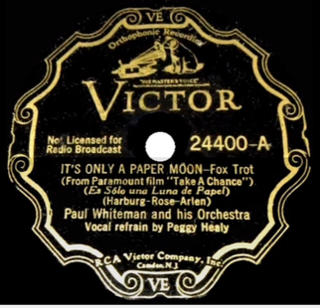
"It's Only a Paper Moon" is a popular song published in 1933 with music by Harold Arlen and lyrics by Yip Harburg and Billy Rose.
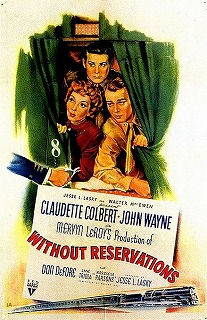
Without Reservations is a 1946 RKO Radio Pictures American comedy film directed by Mervyn LeRoy and starring Claudette Colbert, John Wayne and Don DeFore. The film was adapted by Andrew Solt from the novel Thanks, God! I'll Take It From Here by Jane Allen and Mae Livingston.

Hollywood Canteen is a 1944 American musical romantic comedy film starring Joan Leslie, Robert Hutton, Dane Clark and features many stars in cameo roles. and produced by Warner Bros. The film was written and directed by Delmer Daves and received three Oscar nominations.

Footsteps in the Dark is a light-hearted 1941 mystery film, starring Errol Flynn as an amateur detective investigating a murder.
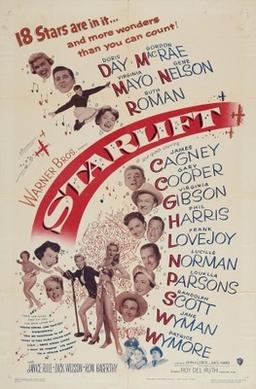
Starlift is a 1951 American musical film released by Warner Bros. starring Doris Day, Gordon MacRae, Virginia Mayo, Dick Wesson, and Ruth Roman. It was directed by Roy Del Ruth and written by John D. Klorer and Karl Kamb, from a story by Klorer. The film was made during the beginning of the Korean War and centers on a U.S. Air Force flyer's wish to meet a film star, and her fellow stars' efforts to perform for injured men at the air force base.
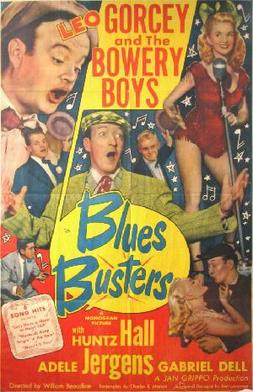
Blues Busters is a 1950 American comedy film directed by William Beaudine and starring The Bowery Boys. The film was released on October 29, 1950 by Monogram Pictures and is the twentieth film in the series.

The Corpse Came C.O.D. is a 1947 American comedy mystery film directed by Henry Levin, produced by Samuel Bischoff and starring George Brent, Joan Blondell and Adele Jergens. The comedic mystery is notable for featuring cameos by Hollywood gossip columnists appearing as themselves: Harrison Carroll, Jimmy Fidler, George Fisher, Hedda Hopper, Erskine Johnson, Louella Parsons, and Sidney Skolsky. The movie is based on a novel by columnist Jimmy Starr, who also appears in the movie. The title makes reference to the practice of cash on delivery. It was produced and distributed by Columbia Pictures.
Hollywood Hotel is an American radio program that was broadcast in the 1930s. It featured Hollywood stars in dramatized versions of then-current movies and "helped to make Hollywood an origination point for major radio programs." Radio historian John Dunning called the program, sponsored by Campbell Soup Company, "the most glamorous show of its time." The program was the inspiration for the 1937 Warner Brothers movie of the same title, which featured Louella Parsons as herself.
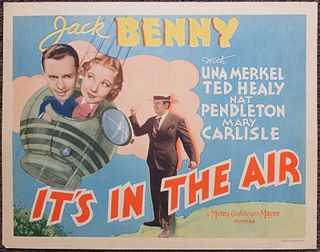
It's in the Air is a 1935 American comedy film directed by Charles Reisner and written by Byron Morgan and Lew Lipton. The film stars Jack Benny in his final film for MGM, Ted Healy, Una Merkel, Nat Pendleton, Mary Carlisle and Grant Mitchell. It's in the Air was released on October 11, 1935, by Metro-Goldwyn-Mayer.
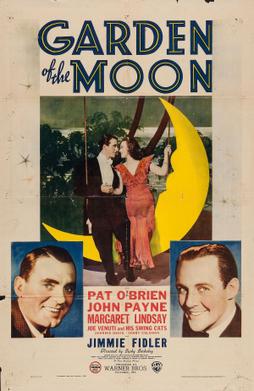
Garden of the Moon is a 1938 American comedy film directed by Busby Berkeley and screenplay by Jerry Wald and story by Richard Macaulay. The film stars Pat O'Brien, Margaret Lindsay, John Payne, Johnnie Davis, Melville Cooper and Isabel Jeans. The film was released by Warner Bros. on October 1, 1938.


















